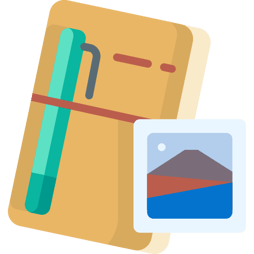There’s magic to be found in journaling. This simple act of writing is a therapeutic and powerful form of self-coaching. It also creates a system through which your goals can be set and accomplished.

What is journaling?
Journaling records your thoughts, feelings, values, and beliefs. It can be unfiltered and unstructured or a well-defined bullet list that helps you track your everyday life. There are no rules other than the guidelines you make for yourself.
While many enjoy putting pen to paper, more modern journaling has adapted to tech, with apps dedicated to note-taking, some even featuring prompts.
What are the health benefits of journaling?
Many studies have shown that there are many health benefits of journaling. Cambridge researchers reported that journaling reduces blood pressure and improves the immune system. Science shows that organising your thoughts and emotions can help you heal from trauma, manage anxiety and stress, and cope with depression.
Journaling helps you become aware of personal triggers and issues by creating a coherent narrative that can help you gain perspective and clarity more rationally and analytically. This can boost your mood and enhance your overall sense of well-being.
Journaling is a great habit providing the space and time to explore and connect with yourself. It allows you to reflect and note what’s important to you. Taking the time to consider and articulate your thoughts and feelings often has the added benefit of clarifying motivations and expectations without censorship.
Journaling and goal setting
Writing down your goals turns vague desires into physical targets. It forces you to:
- Actively think about your goals
- Prioritise and organise your goals
- Record your progress, both failures and successes
- Track patterns
- Adapt, expand, and modify your goals as you go along
- Stay accountable
- Get creative with how to achieve your goals
- Identify obstacles, both intrinsic (e.g. personal limitations and hidden fears) and extrinsic, that may be holding you back
- Problem solve
- Cultivate gratitude
- Build confidence

How to journal
Whether armed with a pen and notebook or a digital journaling app, a great way to start is by asking yourself simple questions such as:
- What do I want to achieve?
- How am I feeling?
- What am I grateful for today?
Once you get into the groove of journaling, you can dive deeper and become more specific. For example, if your goal is wellness-related, you can keep a Food Journal that helps you track your eating. You can then adapt your food choices to align with your goal. Naluri’s Food Journal provides an additional benefit of a dietitian coach responding and providing feedback for your meal choices.
This article is brought to you by Naluri Mental Health Coaches. Naluri empowers you to develop healthy lifestyle habits, achieve meaningful health outcomes, and be healthier and happier through personalised coaching, structured programmes, self-guided lessons, and health tools and devices. Download the Naluri App today or contact hello@naluri.life for more information on utilising digital health coaching and therapy to become a happier, healthier you.
